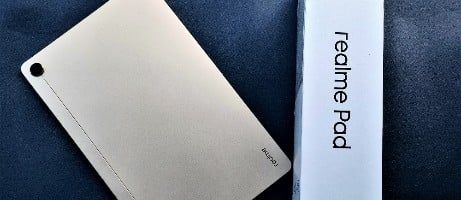
The Android tablet segment has stagnated since Google quit on it to focus on Chrome OS, having shied away from the winning formula that was the Nexus 7 to developing big, expensive tablets such as the Nexus 10. This left Samsung and Lenovo to dominate with their mid-range and premium devices and Amazon to clean up the affordable segment with its popular Fire tablets. 2021 is seeing something of a resurgence in the Android tablet segment, though, with new OEM's such as Realme looking at the sector as a way to further expand their ecosystems and the return of Xiaomi with its new Pad 5 line-up.
We've spent some time with the affordable Realme Pad which aims to disrupt the status quo in the Android tablet market. Join us after the break to find out if it was successful.
I have a confession to make.
I'm a huge fan of Android tablets and while I appreciate the quality and popularity of Apple's iPad offerings, they just don't work for me. I've had an Android tablet in my possession starting from the original Galaxy Tab, to the Acer Iconia A500, Galaxy Tab Note 10.1, Nexus 7, Galaxy Tab 2/3, Sony's excellent Xperia Tablet Compact, Huawei's MediaPad M5, back to Samsung's Galaxy Tab S5E and currently the Tab S6 LTE, and there's probably a couple of models missing from that line-up.
I usually buy, yes I said buy, none of those were review units, tablets with cellular connectivity which is a throwback to when I used the original Galaxy Tab, the Galaxy Tab Pro 8.4, and Galaxy Tab 3 as a phone. Yup, I'm that guy although I hardly ever do phone calls, thankfully. What I'm trying to say here is that I'm not going to be comparing apples to oranges, or rather the orange to the apple in this review of the Realme Pad.
Design

Right from the start, the Realme Pad shows off its intentions with its aluminum construction which lends a premium feel to the experience. There are rounded corners and smooth transitions from display to the aluminum body with no sharp edges to be felt although the rear camera housing does protrude noticeably. In the hand, the Realme Pad feels like it should be more expensive than it is, which is no bad thing.
Unusually, the 3.5mm audio jack (yes, there is one) is located on the bottom left corner, with a speaker chamber on either side of the central USB-C charging port. The right-hand side sports the volume rocker with the hybrid SIM/MicroSD slot below, while the power button sits on the top edge to the right of another pair of speaker chambers. The selfie camera is meant for landscape usage, which is probably how you would place the tablet during video calls.
Hardware
| Realme Pad | |
|---|---|
| Software | Realme UI for Pad v1, Android 11 |
| Display | 10.4-inch LCD, WUXGA+ Resolution (2000 x 1200), 15.9 Aspect Ratio, 60Hz |
| Processor | MediaTek Helio G80 Octa-core, Mali-G52 GPU |
| Memory | 3/4/6GB |
| Storage | 32/64/128GB |
| MicroSD Support | Yes |
| Rear Camera | 8MP |
| Front Camera | 8MP, 105° lens |
| Audio Jack | Yes |
| Audio | Stereo Quad Speakers, Dolby Atmos, Adaptive Surround Sound |
| Networking | Dual Nano-SIM, 4G/LTE (Hybrid SIM tray) |
| Connectivity | WiFi 802.11 a/b/g/n/ac (2.4GHz & 5GHz), Bluetooth: 5.0 |
| Sensors | Light Sensor, Acceleration Sensor, Hall Sensor, Gyro-meter |
| Battery | 7,100mAh, USB-C, 18W Quick-charging, Reverse Charging |
| Dimensions | 246.1 x 155.9 x 6.9mm |
| Weight | 440g |
| Colors | Real Grey, Real Gold |
Performance

With tablets being used for content consumption, a good display is an integral part of the experience. Thankfully, the 10.4-inch IPS screen is bright and vibrant with good viewing angles, albeit with a slightly odd 15:9 aspect ratio and WUXGA+ resolution (2000 x 1200) which takes a little getting used to. Taking the Realme Pad outdoors reveals the unfortunate result of a glossy display with 360 nits of brightness which doesn't perform great under direct sunlight. It does have support for Widevina L1, though, which means you can enjoy streaming content in 1080p resolution.
Powered by MediaTek's Helio G80 processor, the Realme Pad isn't going to go head-to-head with the likes of Samsung's Galaxy Tab S7 but it still offers respectable performance. So long as you dial the graphics down for Call of Duty Mobile it's still possible to nail the top spot in FrontLine without suffering lag or stutters. Sure, it would have been nice to at least see the recently released Helio G96 chipset used, but the G80 does the job.
With two speakers on the top and bottom of the tablet (when held in portrait mode), the Realme Pad produces some great audio which is supplemented nicely by Dolby Atmos.
We had the 6/128GB variant in for testing which performed well with multitasking although it's also available in 3GB and 4GB memory options which may not fare as well. We ran the Realme Pad through the 3D Mark, Geekbench 5, and GFXBench benchmarking apps, with the results embedded below:
Battery

Battery life is where the Realme Pad excels thanks to its big 7,100mAh battery and ability to sleep between times of usage without depleting its battery. I've been getting around 9 hours of screen time with sessions interspersed with long periods of the tablet being on standby, which is excellent news as it's terribly frustrating to pick up a tablet with a flat battery.
When it comes to topping up the battery, Realme Pad offers 18w charging which means that it takes close to three hours to recharge the battery from 0-100%. A 30-minute charge will result in a 20% top-up though, which should get you close to a couple of hours usage. It's by no means fast but definitely not the worst we've seen, still, it's a shame that Realme couldn't squeeze in its 30W SuperDart charging technology.
Software

This is Realme's first foray into the world of Android tablets and as you might expect, there are a couple of foibles that need mentioning. Realme UI for Pad is based on Android 11 and pretty close to what is considered to be a ‘stock' Android UI but without the level of customization seen on the brand's smartphones. It's a basic home screen that you'll see when you boot up the Realme Pad, clean and free of bloatware with an extremely shallow learning curve. An app drawer is available as are basic dark mode and split-screen, but otherwise, you'll be surprised at how uncluttered the Realme UI for Pad aesthetic is when compared with Samsung's One UI.
With the review unit sporting SIM slots and LTE connectivity, it can be used as a phone if necessary, with Phone and Messaging apps present on the home screen.
Camera

If you simply must use the Realme Pad to take phones, you'll find that the 8MP rear sensor takes acceptable images in good-lighting conditions for instant messaging and the like. The 8MP front-facing camera is fine for video calls. Personally, I'd prefer tablet-makers to drop the rear cameras entirely in favor of either a higher-spec selfie camera or cost-saving.
As you might expect, the camera app is pretty bare of features but what is there is enough to get the basics done.

Conclusion

Firstly, it's great to see a brand like Realme enter the Android tablet segment with the Pad making a good first step. Featuring a premium aluminum body, a vibrant display, and excellent audio thanks to the four speakers with Dolby Atmos, the Realme Pad also sports an audio jack, MicroSD card slot, and a clean Android UI.
The Realme Pad is perfectly suited to streaming content and browsing for extended sessions thanks to its impressive battery life. It's ok for gaming as well so long as you don't expect high-level graphics and in general usage, it punches above its weight.
Priced from $140 in India for the 3/32GB version, the 6/128GB variant that we reviewed is headed to Europe sometime in what's left of 2021 although the date and pricing haven't yet been finalized. As long as the pricing remains affordable the Realme Pad should be a hit during the holiday season in Europe. Once Realme reveals the European and UK pricing we'll update the article accordingly.
- A fan-favorite Google Photos feature is finally making its comeback

- The Best Smart Home Lamps

- This new Netflix thriller is blowing up and you can binge it all tonight

























Dont see much usage for the 6/128GB variant when it comes to this tablet,I would probably just stick with the basic 3/32GB WiFi variant that is available in India.
The extra RAM will come in useful for multitasking & Chrome, but the memory card slot means there is no need to spend more for the extra storage.
Upto an extent,but given that the SoC is just about passable,I think you will suffer slow downs and lags even before full extent of the RAM is utilized.
If at least,Realme had offered the much snappier G90T instead,then perhaps 6GB RAM may have made sense.